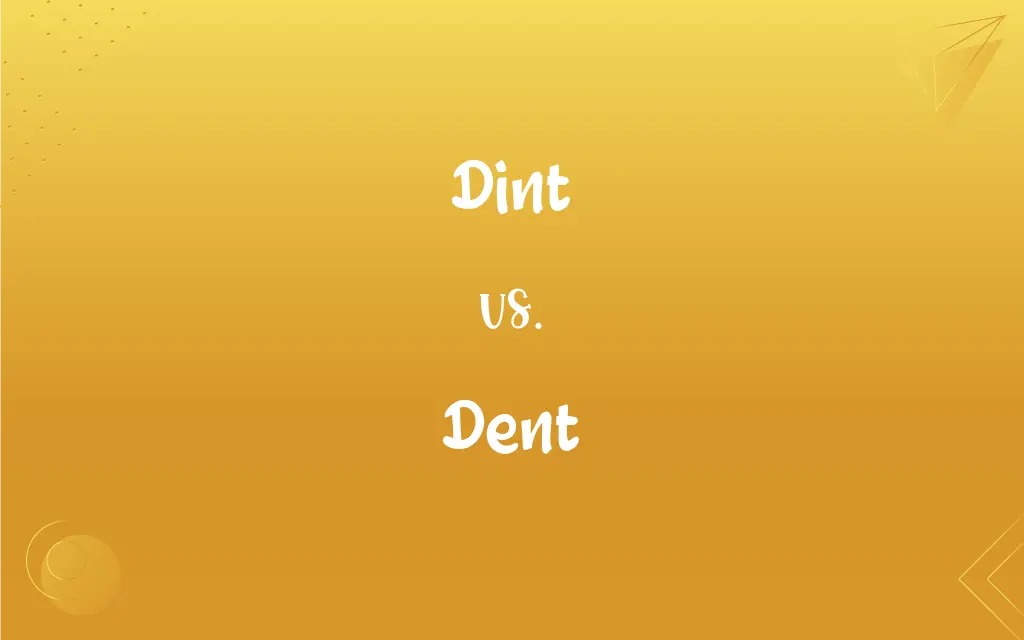Dint vs. Dent: What's the Difference?
Edited by Aimie Carlson || By Harlon Moss || Updated on October 24, 2023
Dint often means force or effort, while dent typically refers to a small depression in a surface.

Key Differences
Dint is a term that originally referred to a blow or strike, especially in the context of battle. Over time, its usage expanded to signify the means or effort by which something is achieved. Dent, on the other hand, typically refers to a small indentation or depression in a surface, usually caused by an impact.
The word dint, in modern contexts, can be used metaphorically to emphasize the force or effort someone puts into an action. For example, one might achieve success "by dint of hard work." Dent is more concrete and visual in its meaning, often related to physical damage. When someone says they put a dent in a car, they mean they caused a noticeable indentation.
In literature, dint can be employed to convey determination or force of character. A character might overcome obstacles "by dint of sheer willpower." Conversely, dent is often used in colloquial expressions to describe a slight reduction or lessening, as in "that news didn't even make a dent in his enthusiasm."
Another interesting observation about dint is its historical significance. The term "by dint of" is somewhat archaic and is less commonly used in modern English than in the past. Dent, conversely, has maintained a consistent presence in the language, especially in the context of automobiles and other objects that can get physically damaged.
In sum, while both dint and dent have origins relating to force or impact, their modern usages diverge significantly. Dint conveys effort or means, while dent is about physical depressions or minor reductions in something.
ADVERTISEMENT
Comparison Chart
Definition
Means or effort by which something is achieved.
Small indentation or depression in a surface.
Origin
Originally referred to a blow or strike.
Refers to an impact resulting in damage.
Modern Usage
Often used metaphorically.
Typically used in a literal sense.
Common Context
Achieving something through effort.
Physical damage to objects like cars or metal surfaces.
Expressions
"By dint of hard work."
"Put a dent in the car."
ADVERTISEMENT
Dint and Dent Definitions
Dint
A blow or strike.
The knight received many dints on his armor during the battle.
Dent
A significant impact or impression.
That experience left a dent in his pride.
Dint
Means by which something is done.
By dint of practice, she became an expert pianist.
Dent
A reduction in quantity or strength.
This incident will make a dent in their sales figures.
Dint
Power or force of character.
She made her way to the top by dint of sheer determination.
Dent
A small hollow mark in a surface.
The ball made a dent in my car's door.
Dint
Force or effort applied.
He succeeded by dint of perseverance.
Dent
A noticeable decrease.
We've made a dent in our debt this year.
Dint
Impact in terms of influence.
His words left a considerable dint on the audience.
Dent
A diminishing effect.
His comments barely made a dent in her confidence.
Dint
Force or effort; power
Succeeded by dint of hard work.
Dent
A depression in a surface made by pressure or a blow
A dent in the side of a car.
FAQs
What does dint primarily signify?
Dint primarily signifies force or effort.
How is "by dint of" used in a sentence?
"By dint of" is used to denote the means or effort, e.g., "She passed the exam by dint of hard study."
Is "dent" usually associated with physical damage?
Yes, dent typically refers to a small depression caused by an impact.
What does "put a dent in" mean?
It means to cause a noticeable decrease or reduction in something.
Is dint used commonly in modern English?
The term "by dint of" is less commonly used in modern English, but it still has its place.
Can one use dint to describe physical blows?
Historically, yes. Dint was once used to refer to blows or strikes.
Do both dint and dent derive from impacts or forces?
Yes, originally both terms were associated with force or impact, but their modern usages have diverged.
Is there a metaphorical usage for "dent"?
Yes, "dent" can be used metaphorically to indicate a slight reduction or lessening in something.
Is "make a dent" always negative?
No, it can be neutral or positive, depending on context, like "making a dent in a project" means progress.
Can dint be used metaphorically?
Yes, dint can be used to metaphorically emphasize effort or force in achieving something.
Is dent primarily a noun?
Yes, dent is primarily used as a noun but can also be used as a verb, as in "to dent something."
What's the difference between a dent and a scratch?
A dent is a depression or indentation, while a scratch is a mark or line on the surface.
Can you replace "by dint of" with "because of"?
While they can be similar, "by dint of" emphasizes effort or means more than "because of."
Can "dent" be used to describe emotional impacts?
Yes, metaphorically, like "That event left a dent in his confidence."
How is the word "dent" related to decrease or reduction?
"Dent" can refer to a noticeable decrease or reduction, as in "making a dent in the problem."
Are there any colloquial expressions using "dent"?
Yes, "not make a dent" means having little to no effect or impact.
What objects are often associated with the word "dent"?
Cars, metal surfaces, or any objects that can get physically damaged.
Which word, dint or dent, has a more historical or archaic feel?
Dint, especially in the phrase "by dint of," has a more archaic feel.
Which word is more abstract in its meaning, dint or dent?
Dint is more abstract, often referring to effort or means, while dent is usually more concrete.
Can dint denote influence?
Yes, especially when indicating the impact or force of someone's actions or words on others.
About Author
Written by
Harlon MossHarlon is a seasoned quality moderator and accomplished content writer for Difference Wiki. An alumnus of the prestigious University of California, he earned his degree in Computer Science. Leveraging his academic background, Harlon brings a meticulous and informed perspective to his work, ensuring content accuracy and excellence.
Edited by
Aimie CarlsonAimie Carlson, holding a master's degree in English literature, is a fervent English language enthusiast. She lends her writing talents to Difference Wiki, a prominent website that specializes in comparisons, offering readers insightful analyses that both captivate and inform.































































